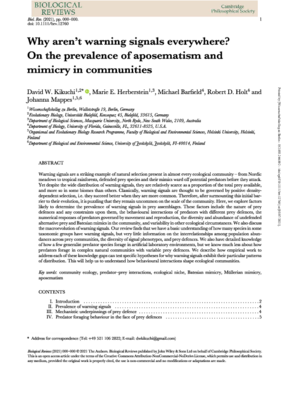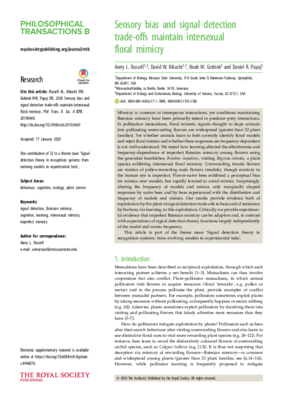
David W. Kikuchi, Ph.D.
Biology
University of Arizona, Tucson
Born in 1984 in Chicago, IL, USA
Studied Biology at the University of Illinois at Urbana-Champaign and at the University of North Carolina at Chapel Hill
Schwerpunkt
Zur theoretischen Integration von Mimikry in die Ökologie von Lebensgemeinschaften
Arbeitsvorhaben
The Ecological Consequences of Communication Between Species
Our spotty knowledge of the ecological impacts of communication is often remarked, but seldom investigated. Perhaps the best understood cases are the formation, maintenance, and coordination of mixed-species groups and the recruitment of parasitoids by plants that have been attacked by herbivorous insects. Yet even for these instances, we have little information on how the transmission of information changes the sizes of the populations of species that participate or the composition of their communities. Answering these questions is critical to understanding how the information that flows between species affects the architecture of their communities.This project will produce a synthesis of current knowledge to establish the state of the art, identify major directions for research, and articulate a vision for the ecology of communication. Focusing on signals that are sent between species, it includes the following: warning signals, Batesian (dishonest) and Müllerian (honest) mimicry, alarm calls, mixed-species flocks, herbivore-induced plant volatiles that recruit parasitoids, flowers that signal to pollinators, territorial signals that function between species, and displays of aggression. I will leverage both ecological interactions and network theory to create a holistic view of the way that species interactions are regulated by signals, and the consequences that their exchanges of information have for the structure of biodiversity.
Recommended Reading
Kikuchi, D. W., A. Dornhaus, V. Gopeechund, and T. N. Sherratt (2019). "Signal categorization by foraging animals depends on ecological diversity." eLife 8:e43965. doi: 10.7554/eLife.43965.
Kikuchi, D. W. and T. N. Sherratt (2015). "Costs of learning and the evolution of mimetic signals." American Naturalist 186: 321-332.
Kikuchi, D. W. and D. W. Pfennig (2013). "Imperfect mimicry and the limits of natural selection." Quarterly Review of Biology 88: 297-315.
Kolloquium, 05.11.2019
Die ökologischen Folgen des Sendens und Empfangens von Signalen
Die Ökologie erforscht, wie Organismen mit ihren Umwelten, einschließlich anderen Organismen, interagieren. Unter Evolution verstehen wir den Prozess, durch den sich eine Population von Organismen über Generationen hinweg verändert. Die Ökologie kann die Evolution beeinflussen, weil sich Organismen an ihre Umwelten anpassen. Lange ging man davon aus, dass die Evolution zu langsam vor sich ginge, um messbare Auswirkungen auf die Ökologie zu haben. Doch das ist nicht der Fall - schon innerhalb weniger Generationen kann die natürliche Auslese große Veränderungen bewirken. Wenn wir indes reziproke Auswirkungen zwischen Ökologie und Evolution beschreiben, bilden wir das Leben genauer ab. Wir müssen diese dynamischen Rückkoppelungen verstehen, um präzise Vorhersagen über Ökosysteme machen zu können.
Ich untersuche die Evolution täuschender Mimikry - wenn sich Organismen in der Evolution zu Signalfälschern entwickelt haben, indem sie "vorgeben", ein anderer Organismus zu sein (den wir als Modell bezeichnen). Häufig tun sie das, um ihren Fressfeinden zu entgehen, indem sie wehrhafte Beutetiere imitieren, die sich mit Gift oder Ungenießbarkeit vor Räubern schützen. Die Erforschung von Mimikry hat uns viele Einblicke in den Prozess der Evolution gewährt, obwohl sie offensichtlich auch das Potenzial hat, sich auf die Ökologie auszuwirken. Da die Nachahmer oft gutes Futter sind, gewinnen sie durch die Imitation wehrhafter Organismen nicht nur Schutz für sich selbst - sie können auch die Anzahl der Angriffe auf ihre Modelle erhöhen! In meinem Projekt will ich verstehen, wie sich die Evolution der Mimikry sowohl auf die Populationen der Nachahmer als auch auf deren Modelle auswirkt. Die möglichen Ergebnisse sehen so aus: auf der Populationsebene ein Vorteil für den Nachahmer auf Kosten des Modells, keinerlei Auswirkung auf beide Populationen, wenn deren Größen nicht von Fressfeinden begrenzt werden, oder der Zusammenbruch des Mimikrysystems durch das Aussterben des Modells.
Publikationen aus der Fellowbibliothek
Kikuchi, David W. (Chicago, Ill., 2022)
The effect of predator population dynamics on Batesian mimicry complexes
Kikuchi, David W. (Oxford, 2021)
Why aren't warning signals everywhere? On the prevalence of aposematism and mimicry in communities
Kikuchi, David W. (Oxford [u.a.], 2020)
Kikuchi, David W. (London, 2020)
Sensory bias and signal detection trade-offs maintain intersexual floral mimicry
Kikuchi, David W. (Chicago, Ill. :, 2015)
Cost of learning and the evolution of mimetic signals



